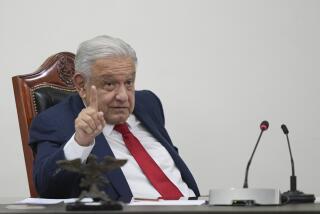Zapatista Rebels Break Off Dialogue With Mexican Government
- Share via
MEXICO CITY — Zapatista rebels broke off contact with the Mexican government Monday, saying Congress had “closed the door to dialogue and peace” by watering down Indian-rights legislation.
The decision, announced by leader Subcommander Marcos in an angry statement from his jungle stronghold in Chiapas state, threw into jeopardy five months of delicate maneuvering to resume peace talks and could lead to a dangerous stalemate between the rebels and the government.
On Saturday, the Chamber of Deputies voted 386-60 for constitutional amendments that would grant Mexico’s estimated 10 million Indians broad autonomy in indigenous territories in the areas of justice, natural resources, education and culture.
Earlier, the Senate voted unanimously in favor of the package. A majority of Mexico’s 32 states still must ratify the amendments for them to become part of the constitution.
However, the version approved by Congress included language limiting the original proposal submitted by President Vicente Fox just days after his inauguration Dec. 1. For example, the revisions require state legislatures to oversee aspects of Indian autonomy, and call for indigenous people to respect private property rights of non-Indians who live within indigenous territories.
Jose Antonio Crespo, a respected political scientist who follows the Chiapas dispute, said Congress could not have adopted the original proposal, which was vague and at times contradictory.
Fox on Sunday appealed “to those few, the very few, who remain unsatisfied” to make concrete proposals addressing their objections to the measure.
“Let’s not discard, discredit, what has been so valiantly achieved up to now,” he said.
Marcos, however, used ominous language in declaring the negotiating process closed.
“We Zapatistas will remain in resistance and rebellion,” he said.
He objected to clauses regarding autonomy, the legal definition of indigenous peoples, the use of natural resources and election of municipal authorities.
Marcos declared that “with this reform, the federal legislators and the Fox government closed the door to dialogue and peace. They give a reason for being to the various armed groups in Mexico [and] sabotage the incipient detente process between the federal government and the Zapatista Army of National Liberation. They betray the hopes of a negotiated solution to the war in Chiapas.”
The rebels surprised the world with their uprising, which began Jan. 1, 1994. A cease-fire was soon reached, and negotiators hammered out an agreement called the San Andres accord in February 1996 that formed the basis of the bill Fox submitted to Congress.
Marcos had made passage of the rights legislation one of three conditions for resuming peace negotiations. Fox already had largely met the other two by releasing imprisoned Zapatistas and closing seven army bases in Zapatista territory.
Marcos led a 16-day caravan through southern Mexico in February and March to appeal for the rights legislation to be adopted, culminating in a dramatic appearance by the masked rebels in the Chamber of Deputies.
Crespo, the political scientist, said the heightened distrust creates a potentially dangerous situation.
“The government has withdrawn the army and taken other risks,” he said in an interview. “[The Zapatistas] have suspended dialogue, which in a certain sense is a renewal of a state of war. Does that mean bringing back the army? That would have a great political cost for Fox.”
More to Read
Sign up for Essential California
The most important California stories and recommendations in your inbox every morning.
You may occasionally receive promotional content from the Los Angeles Times.













